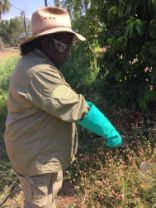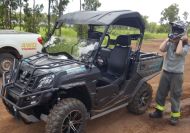
Conservation training in Indigenous communities
We aim to inspire the next generation of people that wish to control weeds or feral animals and environmental scientists. The CLM or Conservation Land Managerment qualifications can be delivered anywhere in the Northern Territory, our trainers will travel to remote Indigenous communities to deliver the CLM I or II qualifications.
Certificate I & II are only delivered for groups of a minimum of ten (10) people, we will travel to your remote community to deliver the training. The training must be fun and engage the students in a positive way, the focus is on practical land mangement and conservation.
Certificate I in Conservation & Land Management (AHC10116)
Core Units – Must do
- AHCWRK101 Maintain the workplace
- AHCWHS101 Work safely
Electives – Choose four (4) units from the following:
- AHCILM202 Observe and report plants and animals
- AHCPCM201 Recognise plants
- AHCNAR201 Carry out natural area restoration works
- AHCMOM204 Undertake operational maintenance of machinery
- AHCCHM201 Apply chemicals under supervision
- AHCPMG201 Treat weeds
- AHCPGD201 Plant trees and shrubs
- AHCMOM203 Operate basic machinery and equipment
- AHCMOM216 Operate side by side utility vehicles
- AHCPGD206 Conduct visual inspection of park facilities
- AHCNAR101 Support natural area conservation
- AHCMOM202 Operate tractors
- AHCMOM217 Operate quad bikes
Certificate II in Conservation & Land Management (AHC21016)
Core Units – Must do
- AHCWHS201 Participate in work health and safety processes
- AHCWRK209 Participate in environmentally sustainable work practices
Group A Electives – Must do 4 units from the following:
- AHCNAR201 Carry out natural area restoration works
- AHCPGD201 Plant trees and shrubs
- AHCPMG201 Treat weeds
- AHCILM202 Observe and report plants and animals
- AHCPCM201 Recognise plants
- AHCPGD206 Conduct visual inspection of park facilities
Group B Electives – Must do 6 units from the following:
- AHCCHM201 Apply chemicals under supervision
- AHCMOM203 Operate basic machinery and equipment
- AHCMOM204 Undertake operational maintenance of machinery
- AHCMOM213 Operate and maintain chainsaws
- AHCPCM203 Fell small trees
- AHCMOM202 Operate tractor
- AHCBIO201 Inspect and clean machinery for plant, animal and soil material
- FWPCOT3259 Operate a four-wheel drive vehicle on unsealed roads
- HLTAID002 Provide basic emergency life support
Electives – Must do 3 units from the following:
- AHCINF204 Fabricate and repair metal or plastic structures
- AHCMOM216 Operate side by side utility vehicles
- AHCMOM217 Operate quad bikes
- AHCCHM307 Prepare and apply chemicals for to control pests, weeds and diseases
- AHCCHM304 Transport, handle and store chemicals
- FWPFGM3215 Perform complex 4X4 operations
- FWPCOT3260 Recover four wheel drive vehicles
Are you interested in learning about plants, animals and the natural world? Land management is a great field of work you can be out bush working in pristine enviroments or rehabilitating land for future generations. You may require animal or plant knowledge for the workplace? If you want to get a job in the Conservation and Land Management Industry these courses may help.
 Weed spraying great way to kill Gamba grass
Weed spraying great way to kill Gamba grass
 Side by side training. Running machinery and learning how to maintian is essential.
Side by side training. Running machinery and learning how to maintian is essential.
Are you interested in learning about plants, animals and the natural world? Land management is a great field of work you can be out bush working in pristine enviroments or rehabilitating land for future generations. You may require animal or plant knowledge for the workplace? If you want to get a job in the Conservation and Land Management Industry these courses may help.
Our trainers aim to inspire and support the next generations of Aboriginal Caring For Country and National Park rangers, weed control operators, tree planters and feral animal managers. Our courses are run in your workplace, community and on country anywhere in the Northern territory. We are happy to travel to your community and work together to meet your needs.
Certificate I and II can be delivered to groups of at least 10 participants at your workplace. The training is designed tobe fun, engaging,all-inclusive and apply practical land management principles across a wide range of topics.
Do you have a ranger groups or council workers that are interested in learning about plants, animals and the natural world? Land management is a great field of work you can be out bush working in pristine enviroments or rehabilitating land for future generations. We have many years experience working with Indigenous groups and will focus on the needs of each location.
Are you responsible for the development and coordination of community ranger groups or council employees that are required to use machinery, equipment and manage natural assets either within the community or on country? Are the individuals interested in developing further skills and knowledge about plants, animals, land management, chemical safety, machinery use and maintenance? A Conservation and Land Management study program can assist your team in gaining new skills, building on existing knowledge in the application of both traditional and western scientific principles. Our team has many years of experience working together on country and in communities and can develop a training program to build on the needs of your work roles and specific duties in your region.
We aim to inspire the next generation of people that wish to control weeds or feral animals and environmental scientists. The CLM or Conservation Land Managerment qualifications can be delivered anywhere in the Northern Territory, our trainers will travel to remote Indigenous communities to deliver the CLM I or II qualifications.
We aim to inspire the next generation of Traditional Owners that wish to be involved in the management of invasive weeds, feral animals and learn to operate a range of machinery and equipment safely.
The training must be fun and engage the students in a positive way, the focus is on practical land mangement and conservation. The training is delivered in a fun, engaging and positive manner and strives to blend traditional knowledge and skills